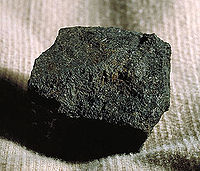
Photo from wikipedia
Recently, the utilization of inferior grade coal for the production of fuel-based materials, i.e., metallurgical coke, is an exciting research area in the industrial sector because of the limited reserves… Click to show full abstract
Recently, the utilization of inferior grade coal for the production of fuel-based materials, i.e., metallurgical coke, is an exciting research area in the industrial sector because of the limited reserves of prime coking coal worldwide. In the steel industry, coal tar is the most abundant and sustainable cost-effective by-product, which is a source of an adequate amount of aromatic components such as phenol or its derivative with polycyclic aromatic hydrocarbons. Therefore, for the first time, we developed a novel organic polymeric additive through a cross-linking polymerization technique using a coal-tar precursor and paraformaldehyde monomer with a glycol-tetraline-based plasticizing agent and explored its application for use as inferior coal in metallurgical coke production. Our synthesized polymer was a homogeneous flowable liquid material; the synthesis process was simple, easily scalable with a high production yield (∼90%), and economical. The interaction of the polymeric additive with the coal matrix was investigated via TGA and H2 evolution study to understand the role of the polymer in coal carbonization. The polymeric additive has significantly improved the crucible swelling number (CSN), fluidity, and plastic layer thickness property of coal. In this connection, we also performed a computational study to rationalize the mechanism of action of the polymeric additive. Exploration of the reaction features through density functional theory calculations offered significant insight into the role of the polymer in assisting coal fluidity development. Addition of the polymer prominently enhanced the coke strength after reaction (CSR) of a non-coking coal enriched blend during carbonization. This study discloses new prospects in the steel industry for the sustainable and bulk scale synthesis of a coal tar-based polymeric additive for the profitable production of metallurgical coke.
Journal Title: Soft matter
Year Published: 2021
Link to full text (if available)
Share on Social Media: Sign Up to like & get
recommendations!